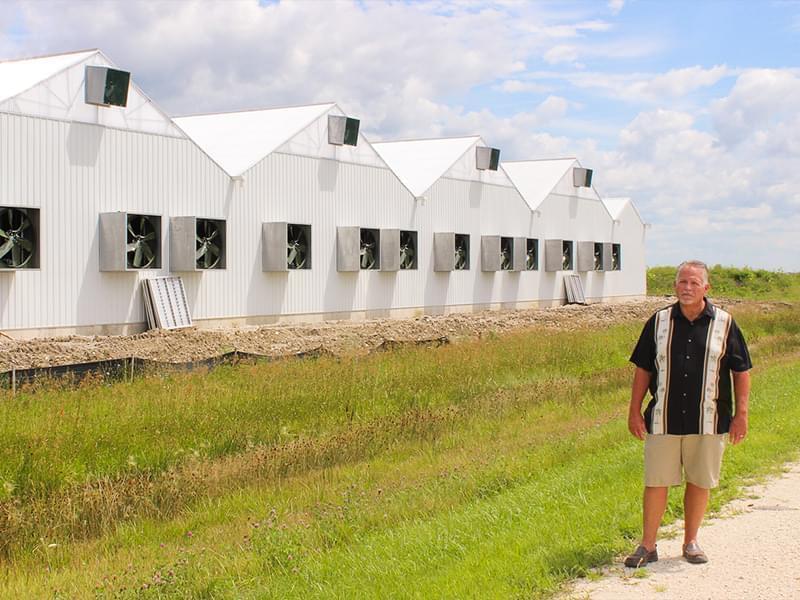State’s Medical Marijuana Crops Readying For Harvest

Revolution Enterprise CEO Tim McGraw and Delavan, Illinois Mayor Liz Skinner cut the ribbon at the new medical marijuana cultivation center in Delavan, in late July, 2015. (Photo: Alex Rusciano / WCBU)
This fall, the first crops of medical marijuana products are on track for shipment to distribution centers across Illinois. Thousands of the cannabis plants have spent the summer growing in a few cultivation centers, nearly two years after state law made it legal.
Alex Rusciano reports on the growth of one cultivation center in Central Illinois:
In late July, Revolution Enterprises cut the ribbon on its sprawling 75,000 square foot facility in the Central Illinois town of Delavan. Company CEO Tim McGraw told supporters the facility’s goal is to change the way cannabis is administered, along with selling products to distributors:
“New delivery methods, new medicines, to continue to study cannabis, because it hasn’t been since the early 1930s, cannabis research has essentially been handcuffed. Well, the handcuffs are coming off with this facility.”
But for that to happen, McGraw says first the company is focusing its energy on finishing construction work, loading equipment and putting the final touches on the $20 million building:
“Water storage, soil storage, beyond those walls is processing, waste disposal…”McGraw says one of the most misunderstood aspects of this fledgling industry in Illinois is how much science is underpinning day-to-day operation:
“This is not some hippies growing pot in their backyard or in a hoop house somewhere. These are the most scientifically-advanced and sophisticated cultivation facilities in the world. We take this very very seriously.”
McGraw says the massive facility will eventually produce medical cannabis plants, extracts, oils and new ingestible and wearable options like patches and other methods he says he can’t talk about. That’s where the science comes in:
“Isolate the cannabinoid molecules and turbanoid molecules that reside in the plants and put them in a dosage form.”
Dan Batzel is the director of chemistry for Revolution Enterprises. He says the Delavan facility has all the intricate lab equipment, a team of food scientists and a professional kitchen area to put a dose of medical marijuana into edible products:
“You know, it’s easy to say brownies because they’ve been traditional. But we can contemplate powders, powdered-drink mixes, tapioca pearls, really we have to sit down with physicians and see what types of dosage forms they think would be best for the patient.”
The center aims to gather up its first harvest next month for research, with a limited release of products in November. A Revolution Enterprises spokesman says the company plans to have about 40 employees working in that same timeframe.
Liz Skinner is the Mayor of Delavan, a town of about 18-hundred people south of Peoria. She says apart from area schools, the plant, is now the largest employer in the small Central Illinois community:
“It really is a big deal. It means jobs and hopefully additional rooftops, financial support for our school district as well as our city.”

Rick Bower outside the PharmaCannis Cultivation Center in Dwight, Illinois
Earlier this summer, Tim McGraw said the cultivation center received hundreds of resumes for just a handful of openings. But at another cultivation center in the state, one employee says the he’s getting into the medical cannabis business for more of a personal reason. Medical marijuana is helping an extended family member manage a rare form of epilepsy:
“The change in him has been remarkable. Absolutely remarkable. He went from a child who didn’t smile much to rather gregarious, and he’s really coming out of his shell. And they expect him to hopefully start talking soon.”
Rick Bower is the first warehousing director for PharmaCannis located further northeast in Dwight. He says it’s exciting to join an industry getting built from the ground up in Illinois:
“We literally get to write the book so-to-speak and set the table the way we want, which in a business person’s perspective that’s the ideal scenario.”
The PharmaCannis Cultivation Center in Dwight has nearly 10 employees and plans to add more. Bower says local hiring could help reduce area unemployment that still reflects Dwight Correctional Center closing two years ago.
That may be a driving force that keeps the state’s medical marijuana pilot program in operation beyond its sunset. In addition to the potential medical value of the substance, the jobs, bricks and mortar and economic opportunities the burgeoning industry stands to offer, might make it too beneficial to let go.
Links
- Medical Marijuana Company Looks To Start Growing
- Illinois Medical Marijuana Approved For PTSD, Osteoarthritis, But Not Diabetes
- Medical Marijuana Growing, Distribution Licenses Awarded After Delay
- Durbin: Feds Will Have To Address Medical Marijuana Law
- Data Shows Competition To Start Up Medical Marijuana Facilities
- Illinois Medical Marijuana Applications Due Monday
- The Demand For Medical Cannabis In Illinois
